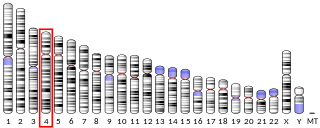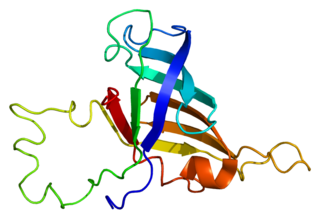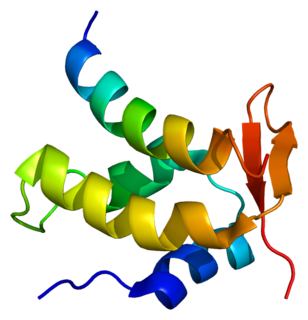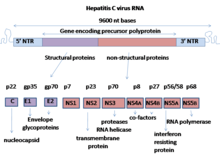
The hepatitis C virus (HCV) is a small, enveloped, positive-sense single-stranded RNA virus of the family Flaviviridae. The hepatitis C virus is the cause of hepatitis C and some cancers such as liver cancer and lymphomas in humans.

Hepatitis C alternative reading frame stem-loop is a conserved secondary structure motif identified in the RNA genome of the Hepatitis C virus (HCV) which is proposed to have an important role in regulating translation and repression of the viral genome.

DNA-directed RNA polymerase II subunit RPB3 is an enzyme that in humans is encoded by the POLR2C gene.

DNA-directed RNA polymerases I, II, and III subunit RPABC1 is a protein that in humans is encoded by the POLR2E gene.

DNA-directed RNA polymerase II subunit RPB2 is an enzyme that in humans is encoded by the POLR2B gene.

DNA-directed RNA polymerase II subunit RPB7 is an enzyme that in humans is encoded by the POLR2G gene.

DNA-directed RNA polymerases I, II, and III subunit RPABC3 is a protein that in humans is encoded by the POLR2H gene.

DNA-directed RNA polymerases I, II, and III subunit RPABC2 is a protein that in humans is encoded by the POLR2F gene.

DNA-directed RNA polymerases I, II, and III subunit RPABC5 is a protein that in humans is encoded by the POLR2L gene.

DNA-directed RNA polymerase II subunit RPB11-a is an enzyme that in humans is encoded by the POLR2J gene.

DNA-directed RNA polymerase II subunit RPB4 is an enzyme that in humans is encoded by the POLR2D gene.

DNA-directed RNA polymerase II subunit RPB9 is an enzyme that in humans is encoded by the POLR2I gene.

RNA polymerase II subunit A C-terminal domain phosphatase is an enzyme that in humans is encoded by the CTDP1 gene.

TATA-binding protein-associated factor 172 is a protein that in humans is encoded by the BTAF1 gene.

Cleavage and polyadenylation specificity factor subunit 4 is a protein that in humans is encoded by the CPSF4 gene.
NS2-3 protease is an enzyme responsible for proteolytic cleavage between NS2 and NS3, which are non-structural proteins that form part of the HCV virus particle. NS3 protease of hepatitis C virus, on the other hand, is responsible for the cleavage of non-structural protein downstream. Both of these proteases are directly involved in HCV genome replication, that is, during the viral life-cycle that leads to virus multiplication in the host that has been infected by the virus.

Nonstructural protein 5A (NS5A) is a zinc-binding and proline-rich hydrophilic phosphoprotein that plays a key role in Hepatitis C virus RNA replication. It appears to be a dimeric form without trans-membrane helices.

Nonstructural protein 2 (NS2) is a viral protein found in the hepatitis C virus. It is also produced by influenza viruses, and is alternatively known as the nuclear export protein (NEP).
RIG-like receptors are a type of intracellular pattern recognition receptor involved in the recognition of viruses by the innate immune system. RIG-I is the best characterized receptor within the RIG-I like receptor (RLR) family. Together with MDA5 and LGP2, this family of cytoplasmic pattern recognition receptors (PRRs) are sentinels for intracellular viral RNA that is a product of viral infection. The RLR receptors provide frontline defence against viral infections in most tissues.

Nonstructural protein 5A (NS5A) inhibitors are direct acting antiviral agents (DAAs) that target viral proteins, and their development was a culmination of increased understanding of the viral life cycle combined with advances in drug discovery technology. However, their mechanism of action is complex and not fully understood. NS5A inhibitors were the focus of much attention when they emerged as a part of the first curative treatment for hepatitis C virus (HCV) infections in 2014. Favorable characteristics have been introduced through varied structural changes, and structural similarities between NS5A inhibitors that are clinically approved are readily apparent. Despite the recent introduction of numerous new antiviral drugs, resistance is still a concern and these inhibitors are therefore always used in combination with other drugs.















